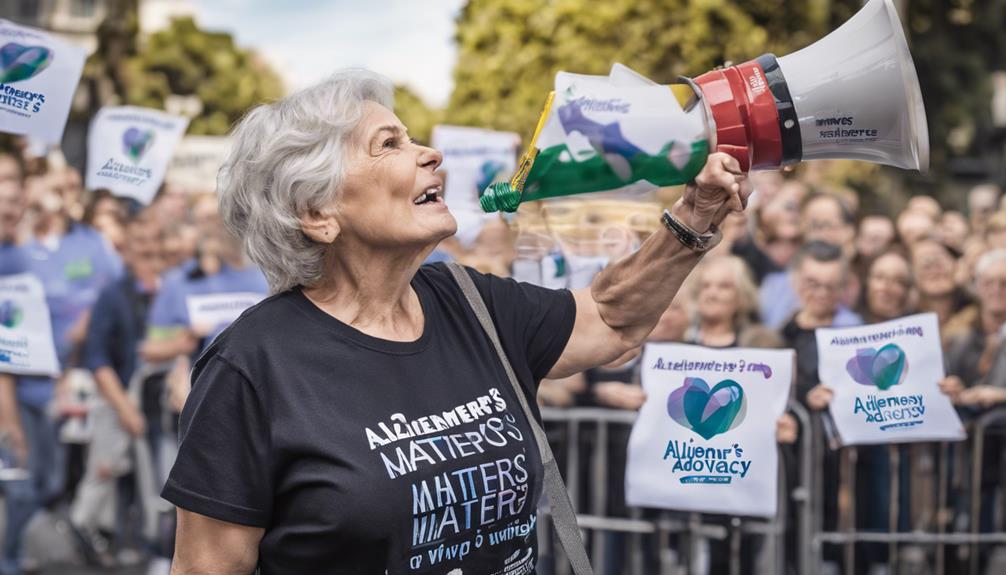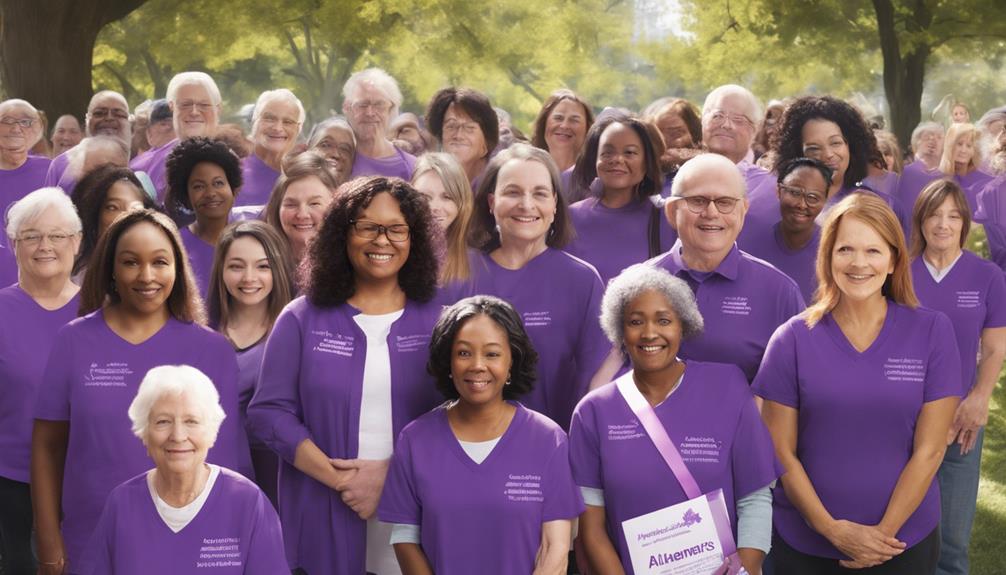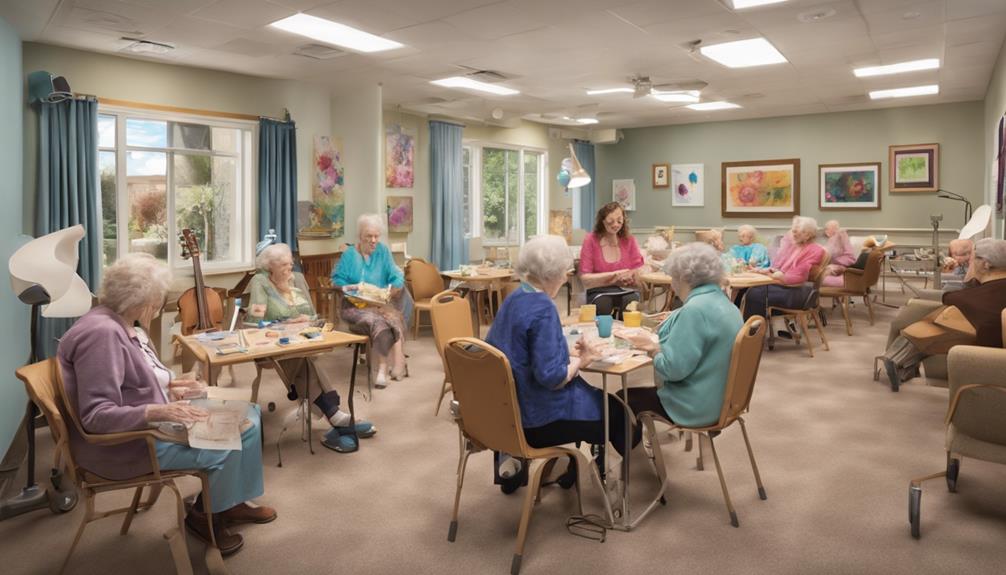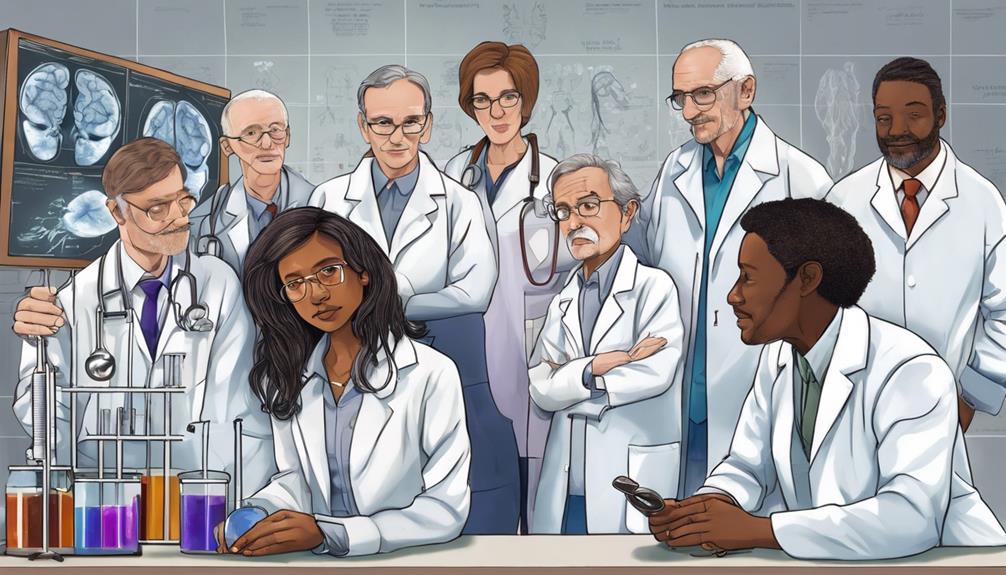In our most recent discussion with Aria Alzheimer, she shared a touching story about her grandmother’s battle with Alzheimer’s disease, which inspired her to become an advocate. Aria’s talent for blending her personal journey with her career aspirations is truly inspiring.
Her dedication to raising awareness and implementing impactful campaigns has garnered significant attention. However, it is her innovative collaborations and ambitious goals for the future that truly set her apart.
Stay tuned to discover how Aria’s work is shaping the landscape of Alzheimer’s research and support in profound ways.
Key Takeaways
- Aria’s personal Alzheimer’s connection drives advocacy and research.
- Collaborations amplify impact and accelerate breakthroughs in Alzheimer’s research.
- Community engagement focuses on awareness, support, and policy change.
- Funding research, enhancing support programs, and promoting early detection are priorities.
Aria’s Personal Connection to Alzheimer’s

Aria’s profound familial history with Alzheimer’s disease has deeply influenced our perspective and dedication to Alzheimer’s research. Our journey began with the realization that Alzheimer’s not only affects the individual diagnosed but also has a profound impact on their loved ones. Witnessing the cognitive decline and emotional toll it took on our family members motivated us to delve into understanding this neurodegenerative disease at its core.
Through rigorous scientific inquiry, we’ve explored the intricate mechanisms underlying Alzheimer’s pathology. Our investigations have led us to appreciate the complex interplay of genetic, environmental, and lifestyle factors that contribute to disease progression. By dissecting these components, we aim to unravel novel therapeutic targets that hold promise for effective interventions.
Our commitment to Alzheimer’s research is fueled by a deep-seated desire to alleviate the suffering caused by this debilitating condition. We strive to contribute meaningful insights that will ultimately pave the way for improved diagnostics, treatments, and, ultimately, a cure for Alzheimer’s disease.
Advocacy Work and Campaign Initiatives

We actively engage in policy change efforts to advocate for better support systems for individuals affected by Alzheimer’s.
Through grassroots outreach programs, we aim to raise awareness and promote early detection strategies in communities.
These initiatives are crucial in driving forward progress in Alzheimer’s care and research.
Policy Change Efforts
Efforts to enact policy changes in the realm of Alzheimer’s advocacy involve strategic campaigns and targeted initiatives. These initiatives aim to influence policymakers and legislators to prioritize Alzheimer’s research, care, and support. Here are three key strategies commonly used in policy change efforts:
- Legislative Advocacy: This involves engaging with elected officials to introduce and support bills that address Alzheimer’s funding, caregiver support, and research initiatives.
- Coalition Building: Establishing partnerships with other organizations, healthcare providers, and community groups to amplify advocacy efforts and increase awareness about the importance of Alzheimer’s policy changes.
- Media Campaigns: Utilizing traditional and digital media platforms to raise public awareness, educate the community, and garner support for Alzheimer’s policy change initiatives.
Grassroots Outreach Programs
Advocacy work and campaign initiatives in grassroots outreach programs play a pivotal role in mobilizing communities for Alzheimer’s policy change efforts. These programs aim to raise awareness, promote education, and advocate for improved services and support for individuals affected by Alzheimer’s disease. Through community engagement and mobilization, grassroots initiatives can influence policymakers to prioritize Alzheimer’s research funding and implement policies that enhance the quality of life for patients and caregivers.
| Grassroots Outreach Programs | Description | Impact |
|---|---|---|
| Community Workshops | Educational sessions on Alzheimer’s symptoms and caregiving techniques | Increased knowledge and support for caregivers |
| Advocacy Campaigns | Petition signing, letter writing, and rallies for Alzheimer’s-related policy changes | Political pressure for legislative action |
| Volunteer Drives | Recruitment of volunteers for caregiving, companionship, and advocacy roles | Strengthened community support network |
These grassroots efforts are vital in driving forward the Alzheimer’s advocacy agenda and fostering a more compassionate and informed society.
Awareness Events and Community Outreach

We’ll scrutinize the impact of our events and assess their effectiveness in raising awareness.
By evaluating our outreach strategies, we aim to enhance our community engagement efforts.
This analysis will provide valuable insights for future initiatives to increase our impact in combating Alzheimer’s disease.
Event Impact Assessment
Our assessment of the impact of awareness events and community outreach initiatives is essential in understanding their effectiveness in engaging individuals and promoting Alzheimer’s disease awareness. When evaluating the impact of these initiatives, we consider:
- Attendance Numbers: Tracking the number of individuals participating in events helps us gauge the level of community engagement and interest in Alzheimer’s disease.
- Feedback Analysis: Collecting feedback allows us to assess the audience’s perception of the events, identifying strengths to leverage and areas for improvement.
- Behavioral Changes: Observing any changes in behavior or actions post-event provides insights into the impact of the information shared and the effectiveness of the outreach efforts.
Outreach Strategies Evaluation
Upon evaluating the impact of awareness events and community outreach initiatives, we analyze the effectiveness of our strategies in engaging individuals and fostering Alzheimer’s disease awareness. To assess our outreach efforts, we employ surveys, attendance metrics, and feedback forms to gather quantitative and qualitative data.
By examining the number of participants reached, level of engagement, and knowledge retention post-events, we can gauge the success of our awareness campaigns. Additionally, tracking community involvement, partnerships formed, and media coverage aids in understanding the reach and impact of our outreach initiatives.
Through continuous evaluation and adaptation of our strategies, we strive to maximize our effectiveness in raising awareness about Alzheimer’s disease and providing support to those affected by it.
Collaborations With Alzheimer’s Organizations

In our efforts to advance research and support for Alzheimer’s disease, various collaborations have been established with prominent Alzheimer’s organizations. These collaborations have significantly enhanced our ability to make a meaningful impact in the fight against Alzheimer’s. Here are some key partnerships we’ve forged:
- Alzheimer’s Association: We’ve teamed up with the Alzheimer’s Association to raise awareness about the disease, provide resources for caregivers, and fund critical research initiatives. Through joint events and campaigns, we aim to reach a broader audience and strengthen our advocacy efforts.
- BrightFocus Foundation: Our collaboration with the BrightFocus Foundation focuses on supporting early-career scientists conducting innovative research in the field of Alzheimer’s disease. By providing grants and fostering mentorship opportunities, we strive to accelerate breakthrough discoveries and advancements in treatment.
- UsAgainstAlzheimer’s: Partnering with UsAgainstAlzheimer’s allows us to engage with policymakers, advocate for increased funding for Alzheimer’s research, and promote policies that benefit individuals living with the disease. Together, we work towards a future without Alzheimer’s.
Impact on Alzheimer’s Research and Support

Our collaborations with prominent Alzheimer’s organizations have had a profound impact on advancing research and providing support for individuals affected by the disease. By working closely with these organizations, we have been able to contribute to the development of innovative research projects and the implementation of crucial support programs.
| Impact Area | Description |
|---|---|
| Research Advancements | Through joint efforts, we have funded cutting-edge research projects aimed at understanding the underlying mechanisms of Alzheimer’s disease and exploring potential treatment options. This has led to significant breakthroughs in the field. |
| Support Programs | Our partnerships have enabled the creation of support programs that cater to the diverse needs of individuals living with Alzheimer’s and their caregivers. These programs offer valuable resources, education, and emotional support to enhance the quality of life for those affected. |
| Community Engagement | Together, we have fostered a strong sense of community by organizing awareness campaigns, fundraising events, and initiatives to reduce stigma surrounding Alzheimer’s. These efforts have helped raise public awareness and promote a more inclusive and supportive environment for individuals impacted by the disease. |
Future Goals and Continued Advocacy

With a steadfast commitment to progress and advocacy, our focus remains on spearheading innovative initiatives to further advance Alzheimer’s research and support efforts. As we look towards the future, our goals and continued advocacy efforts include:
- Enhancing Early Detection Methods: Developing and implementing more sensitive and specific diagnostic tools to detect Alzheimer’s disease in its early stages, allowing for prompt intervention and personalized treatment plans.
- Expanding Support Services: Increasing access to comprehensive care and support services for individuals living with Alzheimer’s and their caregivers, including educational resources, counseling, and respite programs to enhance quality of life.
- Promoting Policy Changes: Collaborating with policymakers to advocate for increased funding for Alzheimer’s research, improved healthcare policies, and enhanced community support programs to address the growing impact of Alzheimer’s on individuals and society as a whole.
Through these strategic initiatives, we aim to drive positive change, improve outcomes for those affected by Alzheimer’s, and ultimately work towards a world without this devastating disease.
Frequently Asked Questions
How Many People Are Currently Living With Alzheimer’s Worldwide?
Currently, millions of people worldwide are living with Alzheimer’s disease. It’s estimated that over 50 million individuals are affected by this progressive neurological condition.
The prevalence of Alzheimer’s is expected to increase as the global population ages.
As a result, the need for support services, research, and awareness campaigns is crucial to help those living with Alzheimer’s and their caregivers navigate the challenges associated with the disease.
What Are Some Common Risk Factors for Developing Alzheimer’s Disease?
When it comes to common risk factors for developing Alzheimer’s disease, genetics play a significant role. Lifestyle choices, such as diet and exercise, can also impact one’s risk.
Additionally, factors like cardiovascular health and education level have been linked to the onset of Alzheimer’s.
It’s crucial to stay informed about these risk factors and make proactive choices to potentially reduce the chances of developing this cognitive condition.
Are There Any Promising New Treatments or Therapies Being Developed for Alzheimer’s?
There are promising new treatments and therapies being developed for Alzheimer’s disease. Research is focusing on targeting amyloid plaques and tau tangles, which are believed to play a role in the progression of the disease.
Clinical trials are underway to test drugs that aim to slow down or stop these processes. Additionally, lifestyle interventions like exercise, cognitive stimulation, and a healthy diet are also being studied for their potential benefits in managing Alzheimer’s symptoms.
How Can Family Members and Caregivers Best Support Someone Living With Alzheimer’s?
As family members and caregivers, we can best support someone living with Alzheimer’s by providing a safe and familiar environment, maintaining routines, and engaging in meaningful activities.
It’s crucial to communicate patiently, listen actively, and show empathy.
Encouraging physical exercise, healthy eating, and regular medical check-ups can also enhance their well-being.
What Are Some Ways That Individuals Can Get Involved in Raising Awareness and Supporting Alzheimer’s Research and Advocacy Efforts?
We can actively participate in raising awareness and supporting Alzheimer’s research and advocacy efforts by:
- Joining local organizations
- Attending fundraising events
- Volunteering at memory care facilities
- Participating in research studies
- Advocating for policies that benefit those affected by Alzheimer’s
Conclusion
In conclusion, our work with Alzheimer’s has shed light on the alarming statistic that every 65 seconds, someone in the United States develops the disease.
Through our advocacy efforts, we aim to raise awareness, support research, and provide care for those affected by Alzheimer’s.
Together, we can make a difference in the fight against this devastating illness. Join us in our mission to create a world without Alzheimer’s.








